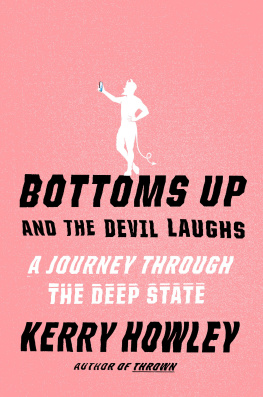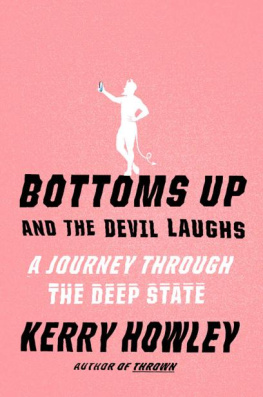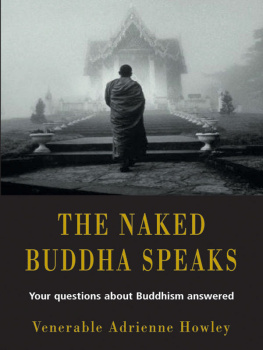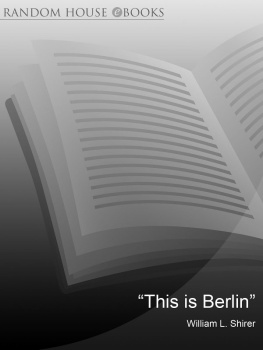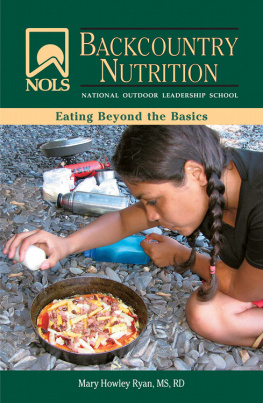FOREWORD
Heres to the Yanks who, working day and night with our British and French allies and with democratic Germans, made the Berlin victory possibleto men like John Digges, who purified the water; to Ben Scheinman, who brought justice to German courts; to Ray Ashworth, who created a strong, democratic police force; and, above all, to Bill Babcock who, as my deputy, carried a terrific load; to the five hundred officers and civilians, men and women, not mentioned by name, who turned Berlin into a Communist repulse; to the woefully thin line of fighting troops, under direct orders of Colonels Bob Willard and Jimmy Duke, who, threatened with annihilation, created an American Army epic with their calm, unflinching courage.
Heres to my wife, Edith, and our four small children, who took the daily insults, threats, and privations of the Communist rats who walked like bears, and to all the wives who stood by their men, as American women have always done, stanch in the conviction that where the Stars and Stripes wave, there is the indestructibility of decency and there is the inspired might of a free people.
FRANK HOWLEY
CHAPTER I
THE cold, inhuman minds in the Kremlin had reached a wicked decision, the most barbarous in history since Genghis Khan reduced conquered cities to pyramids of skulls. In order to retain their tottering control of Berlin, undermined by the development of democratic processes, they decided to starve the Germans into revolt against the Western powers and thus drive us out. When this atrocious crime was to be committed against two and a quarter million people in the American, British, and French sectors was merely a matter of timing. The crime had not gone unrehearsed and the Russians had shown only callous disregard for the consequences.
One Saturday before they imposed the blockade, my medical officer came to me, sad faced and perplexed. Im sorry, Colonel, he said, but the Russians have cut off our milk supply. Unless we get that fresh milk, six thousand German babies in our sector will be dead by Monday.
This news appalled me. I am a family man and I could share the anguish of the German mothers and fathers who were faced with this dreadful calamity. As commandant of the American sector of Berlin, I could not let this happen.
Here is the background of the situation. The Russians possessed the only milk herds in Berlin. When they captured the city, they seized seven thousand cows and drove them over into their sector. The German babies in our sector were fed with fresh milk from these cows, according to an agreement whereby we exchanged American flour for Russian milk. The Russians collected the milk from their farms, and every morning I sent trucks, loaded with flour, to the Russian border to bring back the milk.
The Russians, obviously laying the foundation for the general blockade, kicked at this agreement. They demanded that my trucks collect the milk direct from the farms, saving them labor and, what is more important, precious gasoline. I objected; they were getting our good flour and it was up to them to furnish the milk. An agreement is an agreement. The result was that our fresh-milk supply failed.
Cant you give these children anything else? I asked my medical officer desperately.
Weve got skimmed milk, he replied, but thats useless for their formula.
I had to admit I was licked. There was nothing to do but eat crow and submit, for the time being, at least. The milk shortage was a lesson to me; perhaps I should be grateful to the Russians for providing it so early.
When the blockade was clamped down, I was ready for them. No longer were the German babies in my sector in danger. I had brought in 200 tons of condensed milk and 150 tons of powdered milk. When the Russians screamed to German mothers over the radio that the Americans couldnt feed their babies, I fought back over the air and in the newspapers with a special formula, using prepared milk as a substitute for fresh milk. Not one of my babies died!
I left Berlin on September 6, 1949. On the parade ground outside Truman House, stood a guard of honor. Since I was a cavalry man, a horse platoon lined up with the infantry. Many fellow American officers and representative Allied officers were there to see me off. In the reserved enclosure sat Dr. Ernst Reuter, lord mayor of Western Berlin, and members of the City Assembly. Most impressive was the German crowd of fifteen thousand, almost bursting through the MP ropes.
John J. McCloy, the new American high commissioner for Germany, acting in behalf of President Truman, pinned the Distinguished Service Medal on my blouse and spoke a few complimentary words. It was a unique ceremony, because McCloy was our first civil chief administrator for Germany.
As I stepped back with my wife, Edith, to enter the waiting car, the crowd did break through, and mobbed me. It was as much as I could do to shake a few of the many outstretched hands.
Pushing her way through the crowd came a determined, hat-less woman, her hair strained back from her face, her features pinched and wan, for Berlin rations were still very low. But the sparkle in her eyes transformed that face and hid the marks of suffering and privation.
In her arms she carried a blue-eyed babyas healthy a child as Ive ever seen pictured in a baby contest. This is my baby you saved when the Russians would not give us milk, she told me, tears filling her eyes. We will never forget you, sir. Good-by and good luck!
As the car drove away my wife, understandably overjoyed as she was to be returning to the United States with our children, was wiping her eyes. So was I. The German mothers tribute was as high a reward as I will ever merit. I treasure it.
During my four years in Berlin, I earned a variety of sobriquets from the Russians, mostly uncomplimentary. As first, I was an American brute colonel, and later was promoted to brute general. After being an enemy of democracy, I achieved the ultimate in perverse recognition when I was dubbed the Beast of Berlin. But when I was leaving the city, the British press softened the opprobrium by saying that a legend leaves Berlin.
I was returning to the United States after four years service in Germany. On July 2, 1949, McCloy, a lawyer from my home town of Philadelphia and former president of the United Nations International Bank for Reconstruction and Development, had replaced General Lucius D. Clay, who had been United States military governor in Germany since shortly after the fall of Berlin. Military rule was out; civil rule was in.




